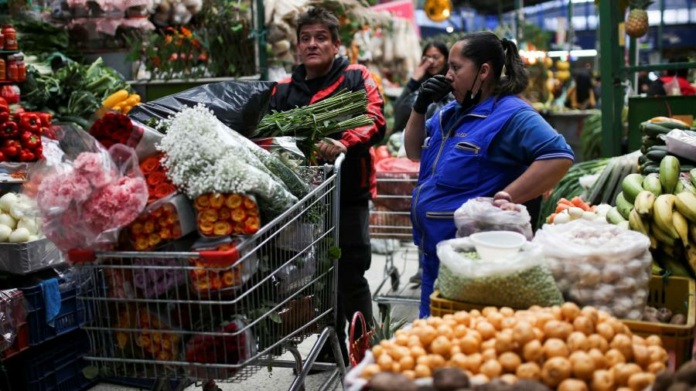After the outbreak of war in Ukraine, inflation spiralling dangerously out of control and punishing waves of coronavirus infections and lockdowns, the IMF this week had more bad news: the pain is far from over and the worst is yet to come.
At the onset of its annual meetings, held jointly with the World Bank, the multilateral lender warned that the “darkest hour” lay ahead. Next year could feel like a recession in much of the world and further sell-offs in markets could not be ruled out.
The twin threats — to growth and financial stability — underscored the enormity of the challenge facing policymakers from central banks and finance ministries that are gathering in Washington, over the coming days.
“Downside risks remain elevated and policy trade-offs are becoming hugely challenging,” Pierre-Olivier Gourinchas, the IMF’s chief economist, told reporters on Tuesday. “The risk of monetary, fiscal or financial policy miscalibration has risen sharply at a time of high uncertainty and growing fragilities.”
The IMF once again downgraded its outlook for global growth for next year to just 2.7 per cent. More worryingly, the fund’s economists see high odds that the economy could fare even worse, with a 25 per cent chance that growth would fall below 2 per cent and as high as a 15 per cent chance that it could fall below 1 per cent.
Nor is inflation expected to moderate quickly, with advanced economies expected to face annual consumer price growth of 7.2 per cent this year and 4.4 per cent next year — a level more than double the longstanding 2 per cent targets. As borrowing costs soared, the financial system’s fragility was also likely to be exposed, acknowledged Tobias Adrian, head of monetary and capital markets at the IMF.
Other analysts shared the fund’s gloomy prognosis. “The worst of the slowdown is ahead of us, not behind us,” said Seth Carpenter, chief global economist at US bank Morgan Stanley. “We see a really big slowdown and outright recession in important economic blocs, [such as] the UK and the euro area. To the extent that there is a recovery, it is only in the emerging markets. And, even then, [it is] somewhat tepid.”
There is also mounting concern that officials’ policy responses will come with increasingly pernicious side effects.
Almost every central bank has turned to sharply higher interest rates to tame inflation. The US Federal Reserve has led the charge, embarking on the most aggressive campaign to tighten monetary policy since the early 1980s after initially misdiagnosing the extent of the inflation problem.

The fund did not remotely think the job had been done, urging monetary policymakers to have a “steady hand” and “stay the course”. Gourinchas stressed that, at this stage, the risk of “over-tightening” and causing a recession was smaller than the risk of allowing high inflation to become ingrained.
The speedy surge in interest rates has threatened to exacerbate a wave of sovereign defaults that has already forced the IMF to enter into discussions with members such as Sri Lanka and Zambia. With markets already on edge, the UK government’s decision to unveil £45bn worth of unfunded tax cuts led to a surge in the country’s cost of financing and threatened to trigger a financial crisis until the Bank of England stepped in and said it would buy sovereign bonds.
Adrian acknowledged that the risks of other economies falling victim to similar financial stability problems would mount.
“There could certainly be financial stability problems and market dysfunction in other countries as well,” he told reporters on Tuesday. The challenge for highly indebted emerging and developing economies will be even more immense, likely resulting in a wave of additional defaults.
He said monetary authorities should be prepared to follow the BoE’s example — intervening to ensure financial stability and fulfil their traditional roles as “lender of last resort” to the financial system.
Increasingly, there are calls for central banks to moderate the pace of tightening — mostly directed at the Fed, which is considering a fourth straight 0.75 percentage point rise at its meeting in early November.
The EU’s chief diplomat, Josep Borrell, complained this week that “everybody has to follow [the Fed’s higher interest rates], because otherwise their currency will be [devalued]”. World Bank economists have also warned about the negative global repercussions of the Fed’s actions.
Others argue that by the time central banks’ aggressive increases have fully worked their way into every corner of the economy, much of the world could be in recession.
Robin Brooks, chief economist of the Institute of International Finance, a trade body for global finance, said there was now a need to at least discuss a global “pivot” away from supersized rate rises because he foresaw a much sharper downturn across Europe and a weaker global economy than the IMF.
Policymakers increasingly appear more attuned to these concerns. Lael Brainard, vice-chair of the Fed, on Monday said the central bank should press ahead with its plans to raise rates, but do so “deliberately and in a data-dependent manner”. This was, she said, due to “elevated global economic and financial uncertainty”.






